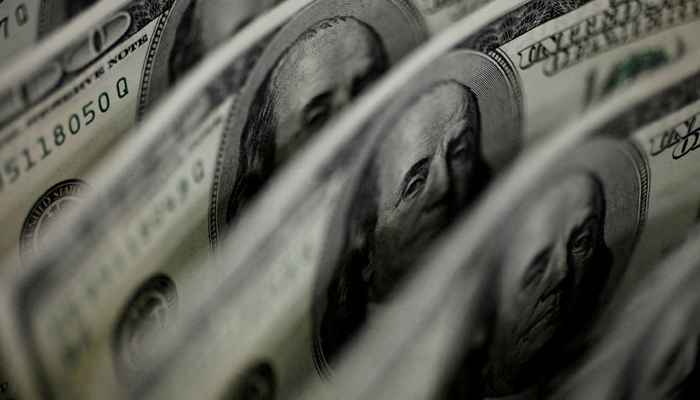How much external debt does Pakistan have to repay in FY25?
It is anticipated that these obligations will be managed comfortably and on time
August 01, 2024

- Pakistan sees improved foreign fund inflows.
- Country will need $17.8bn from Oct to June.
- $16.3 billion is expected to be rolled over.
KARACHI: Pakistan needs to repay $24.8 billion in external debt during the current fiscal year, data from the State Bank of Pakistan (SBP) released on Wednesday showed.
It is anticipated that these obligations will be managed comfortably and on time due to improved foreign fund inflows and moderate current account deficits, The News reported.
The SBP has released numbers regarding international reserves and foreign currency liquidity for the fiscal year 2025, indicating that Pakistan will need $4.98 billion in July, $2 billion in August and September, and $17.8 billion from October to June, bringing the total amount to $24.8 billion to fund its external payment obligations for the entire FY25.
Out of the total $24.8 billion amount, $21.2 billion is principal repayment and $3.6 billion is interest payment.
The total amount of external repayments required for FY25 is slightly less than the $26.2 billion quoted by the SBP Governor Jameel Ahmad during a media and analyst briefing following the monetary policy meeting on Monday.
In terms of gross financing requirements, the governor stated that the total amount of $4 billion is on account of interest, and $22 billion is for principal repayment.
Out of this $22 billion, $16.3 billion is expected to be rolled over, leaving $10 billion to be repaid. Of this amount, $1.1 billion was repaid in July, resulting in net repayments of $9 billion for the first 11 months of this fiscal year.
The State Bank projects that its foreign exchange reserves will reach $13 billion by the end of FY25, up from the current $9.1 billion. The SBP also believes that the quality of these reserves is better than in previous years.
"It is important to note that the due amount in August and September 2024 seems to be only 8.0 per cent of total obligations (as per the SBP’s data) in the year," said Topline Securities in a note.
"As a result, we believe, with the IMF approval expected in August end, FX reserves will improve in Aug/Sep 2024 from the stagnant level of $9 billion in the last four months," it added.
Pakistan has seen dollar inflows of more than $500 million in the last two and a half months. Foreigners investing in high yielding Pakistan T-bills with currency likely to remain stable with a long-term IMF programme, CEO of Topline Securities Muhammad Sohail said.
"The central bank may, due to this, have kept the benchmark interest rate at 19.5 per cent when their estimate for inflation is 11.5-13.5 per cent," Sohail added.
The latest external repayments data from the SBP comes as global rating agency S&P affirmed Pakistan’s long-term sovereign rating as 'CCC+'. This was due to the country’s reliance on external aid to meet its debt obligations amidst a prolonged economic crisis.
Fitch had on Monday upgraded Pakistan’s long-term foreign currency issuer default rating to 'CCC+', due to greater availability of external funding under the new International Monetary Fund (IMF) deal.
Earlier in July, Pakistan secured a $7-billion bailout deal with the IMF to stabilize the economy, as the country was on the brink of a sovereign default.
Pakistan is in discussions with Saudi Arabia, the United Arab Emirates, and China to meet gross financing needs under the IMF programme.
According to the SBP's governor, Pakistan’s external position has improved significantly, with the current account deficit narrowing, reserves increasing (not as borrowed reserves but built through FX market operations), and the forward liability book of the SBP decreasing.
A significant portion of the short-term debt, particularly $8 billion in commercial loans, has been repaid and replaced with long-term multilateral loans. As a result, there are no significant concerns about debt sustainability at present.
The SBP has made a forecast for the current account deficit for the fiscal year 2025. The forecast anticipates a moderate increase in imports, a strong growth in worker remittances, and a projected current account deficit ranging from 0-1% of the gross domestic product (GDP).
In FY2024, the amount of profit and dividend repatriation totalled $2.2 billion, marking a sevenfold increase compared to the previous year. This significant increase is attributed to the settlement of all outstanding profit and dividend payments owed to foreign investors.











